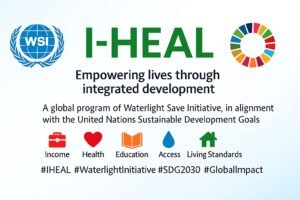
In a significant move to address global inequality and foster sustainable development, the Waterlight Save Initiative, a UN ECOSOC-accredited nonprofit, has launched its groundbreaking I-HEAL Framework. This visionary blueprint is designed to accelerate inclusive and sustainable development across Africa and the Global South. The launch comes as a prelude to the Second World Summit for Social Development, slated for November 4-5, 2025, in Doha, Qatar, where the I-HEAL event will be officially unveiled.
What Does I-HEAL Stand For?
I-HEAL encapsulates five pivotal pillars:
- Income,
- Health,
- Education,
- Access to Water,
- Living Standards,
The Eight Strategic Pillars of the Framework
Guided by a multidimensional vision of progress, I-HEAL relies on eight strategic pillars:- Sustainable Livelihoods & Social Protection
- Climate Justice & Health Equity
- Digital Inclusion for Social Development
- Youth-Led Innovation for Social Change
- Community Resilience & Disaster Preparedness
- Migration, Mobility & Social Integration
- Gender Equity & Intersectional Justice
- Participatory Governance & Civic Engagement
Why Now—and Why Africa?
As Waterlight Save Initiative’s Founder and President, Dr. Prince Ero Ibhafidon, puts it: “I-HEAL is not just a framework. It is a movement. A call to action. A new development narrative where dignity, access, and opportunity are not privileges, but rights for all.” Africa, brimming with resilience, creativity, and leadership—not just in need—stands at the heart of this narrative. I-HEAL reframes the continent and its diaspora as architects of scalable, value-driven solutions, not passive recipients of aid.What to Expect at the Doha Summit
The two-day I-HEAL Summit (November 4–5, 2025) promises to be transformative:- High-level dialogues featuring diplomats, UN partners, and philanthropists
- Grassroots panel discussions spotlighting on-the-ground changemakers
- Innovation showcases led by youth startups
- Workshops on gender, digital equity, and migration
- Cultural exhibitions to bridge lived experiences with policy action
Further Reading:
- Leadership News: https://leadership.ng/waterlight-save-initiative-unveils-i-heal-framework-ahead-of-global-event/#
- Vanguard News: https://www.vanguardngr.com/2025/08/waterlight-save-initiative-launches-i-heal-framework-to-tackle-inequality-ahead-of-global-summit/
- Kakaaki Reporters: https://kakaakireporters.com/initiative-unveils-i-heal-framework-ahead-global-event/
